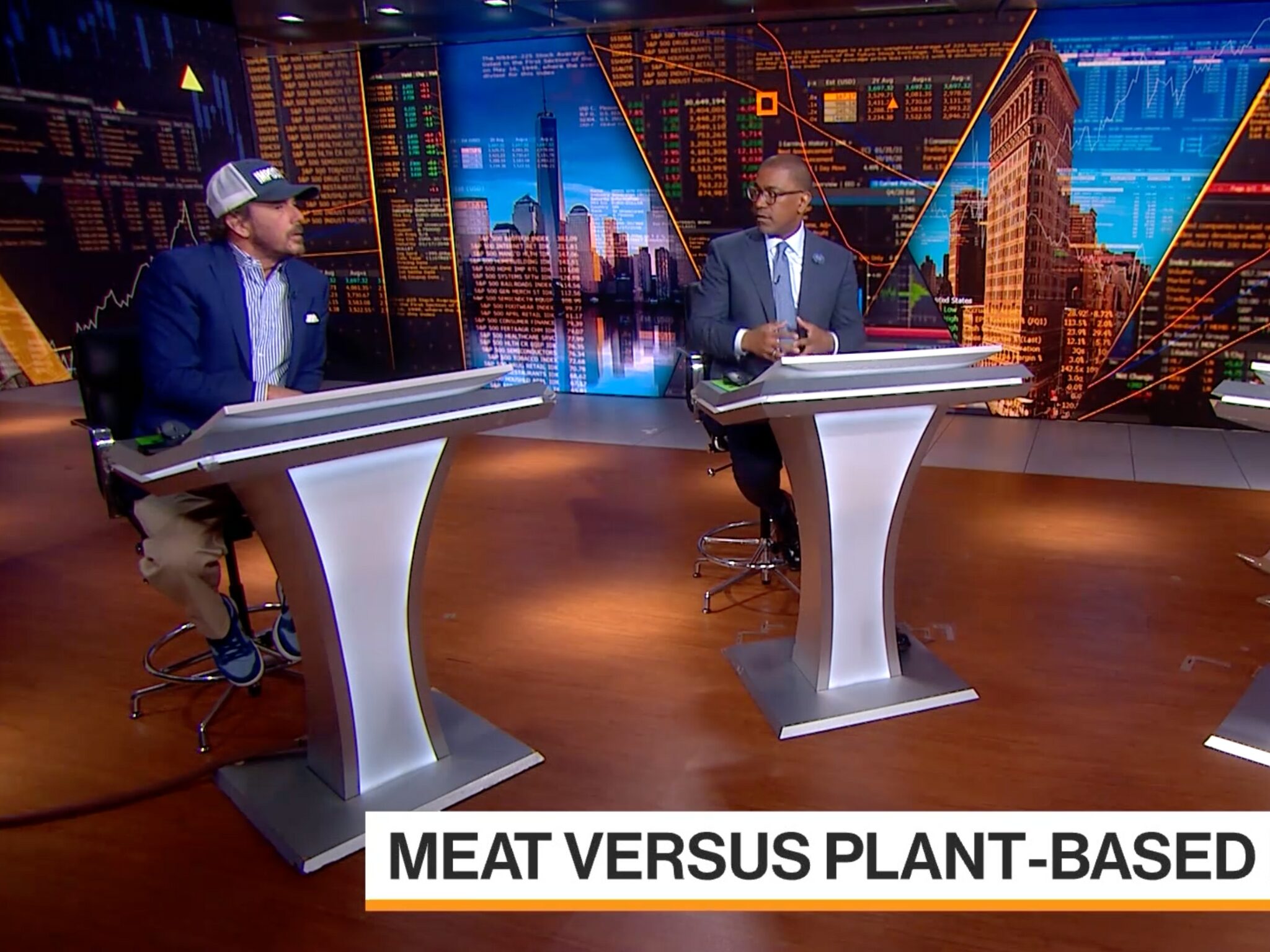Analysing Impossible Foods CEO’s Bloomberg Interview, and What It Implies for Plant-Based Meat
10 Mins Read
Impossible Foods CEO Peter McGuinness sat down with Bloomberg Television to talk about the struggles of plant-based meat, consumer preferences, and a potential IPO.
The plant-based meat category was launched incorrectly, there are too many brands in the space, meat-eaters are key to their success, and someday, an IPO would be nice. These were some of the highlights of a wide-ranging chat between Impossible Foods CEO Peter McGuinness and Bloomberg Television’s Alix Steele and Romaine Bostick.
Over eight minutes, the head of one of the industry’s giants reiterated a lot of things he’s said over the past year, clarified a few others, and revealed a couple more. “We don’t like the sector and the category being where it is, and there’s a lot of reasons why,” he said.
If you read between the lines, you see an executive confident in his company’s position, apprehensive about the wider sector and other brands, and comfortable about not being invited to the Met Gala.
Jokes apart, there are hints that Impossible Foods is using Big Food and Big Meat’s playbook to beat them at their own game and displace those industries. Here’s what McGuinness said over the eight-minute interview, and what it all meant.
“I think it was launched incorrectly from the beginning. It was very climate[-forward], it was very zealot, there was a lot of rhetoric, it was anti-cattle industry. So it got political, it got woke, it got bicoastal, academic, elitist – so that all has to stop.”
McGuinness said something similar in an interview with AgFunderNews last September: “I think the category was not launched in the best possible way. It was launched against the cattle industry. And, you know, no one wants a civil war in America.”
Speaking at the Adweek X conference a few months later, he said: “There was a wokeness to it, there was a bicoastalness to it, there was an academia to it… and there was an elitism to it – and that pissed most of America off.”
Meat industry interest groups and cattle-protecting lawmakers have long been using words like ‘elite’ and ‘woke’ to describe alternative proteins – that rhetoric has become much more noticeable around cultivated meat in the wake of statewide bans in Florida and Alabama, but these phrases have been successful in driving a large portion of consumers away from plant-based analogues.
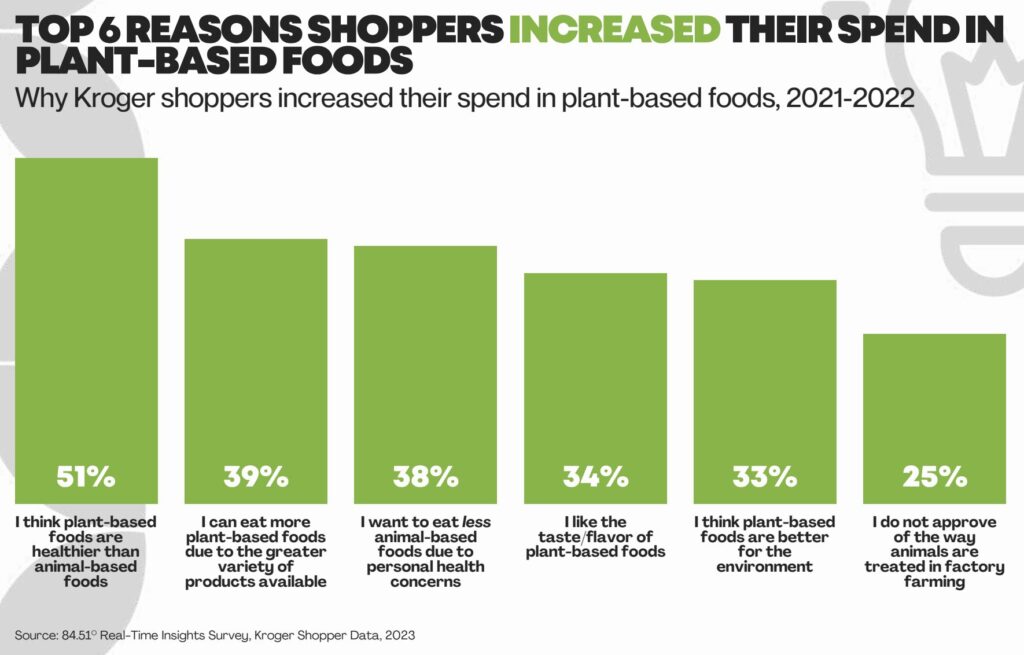
Particularly, the focus on sustainability hasn’t attracted customers the way meat analogue makers would have hoped, and that has led to a shift in their messaging. In March, Impossible Foods unveiled a major brand refresh that saw it switch from green packaging to red to appeal more to meat-eaters, and put a greater spotlight on flavour descriptors and nutritional points (like saturated fat and sodium content”.
This is because these factors are much more important to consumers. According to a Mintel survey from 2023, the top two attributes discouraging Americans from trying plant-based meat are flavour (48%) and nutrition (35%). A poll of Kroger shoppers found that over half (51%) of people buy plant-based meat because they’re healthier, which is the top motivation for these purchases.
“It’s gotta be delicious… It’s gotta be nutritious… And then you gotta be price-competitive.”
This was perhaps the most succinct explanation of where plant-based meat marketing is headed. As alluded to above, Impossible Foods is already focusing on these factors, as is Beyond Meat. In the UK, too, THIS is doing the same.
“Taste is the #1 reason why consumers will decide to purchase a product again or not,” an Impossible Foods spokesperson told Green Queen in November, after its Beef Lite product received the heart-check certification from the American Heart Association.
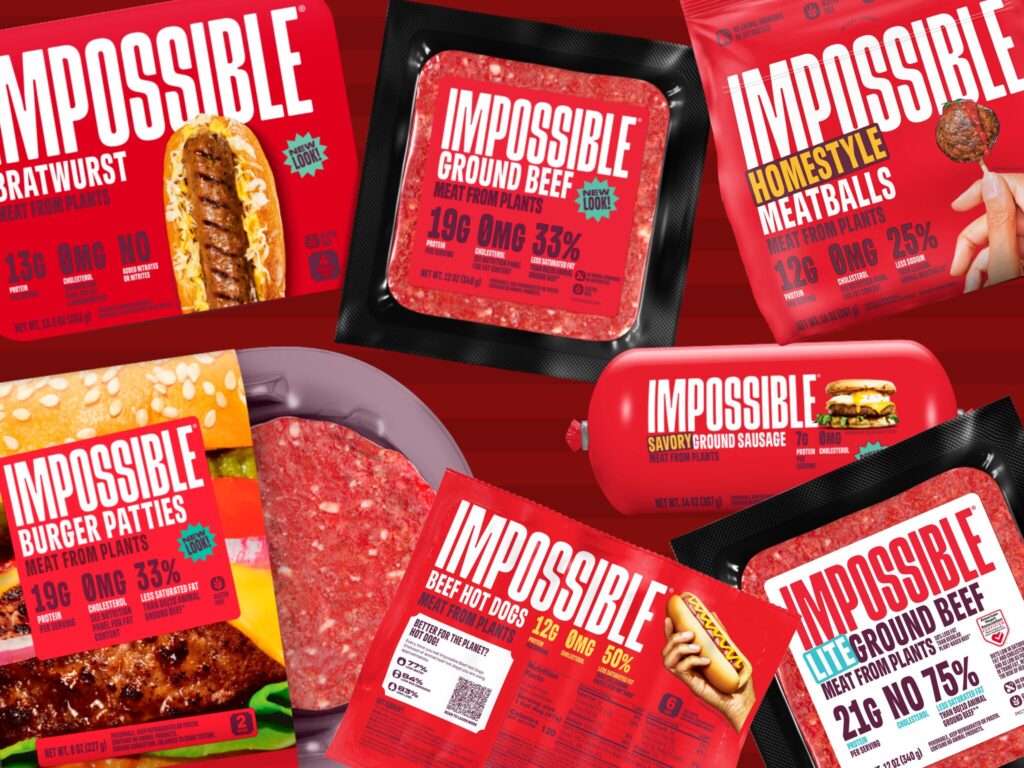
But while flavour is key to bringing consumers back and nutrition important to keep them long-term, in the cost-of-living crisis, price is what will decide whether they pick up these products in the first place. “We’re on average about $1-1.50 less than grass-fed, organic, but we are premium to what I would call ‘the well’, you know, the saran-wrap cellophane stuff,” McGuinness told Bloomberg.
He revealed that the company has brought its prices down by 20% in the last year and a half, while conventional meat is up 18-22% because of higher input and labour costs, and the culling of herds due to famine, drought and diseases.
“We’re in 48,000 foodservice locations, so we’re number one in foodservice in plant-based, but there’s 1.4 million, so we have a lot of work to do.”
The statement outlined Impossible Foods’ intention to roll out its products in more foodservice locations – there’s a general consensus that the risk of chefs preparing a bad meal is lower than individuals cooking these products at home for the first time. This makes restaurants a great entry point.
In fact, McGuinness hit back at Bloomberg’s suggestion that plant-based meat isn’t as “prominent” in fast-food chains anymore. “I just had one at the airport the other day, and it was pretty prominent on the menu board,” he said of the Impossible Whopper, which is available at all 5,500 Burger King locations in the US, as part of a collaboration that began five years ago.
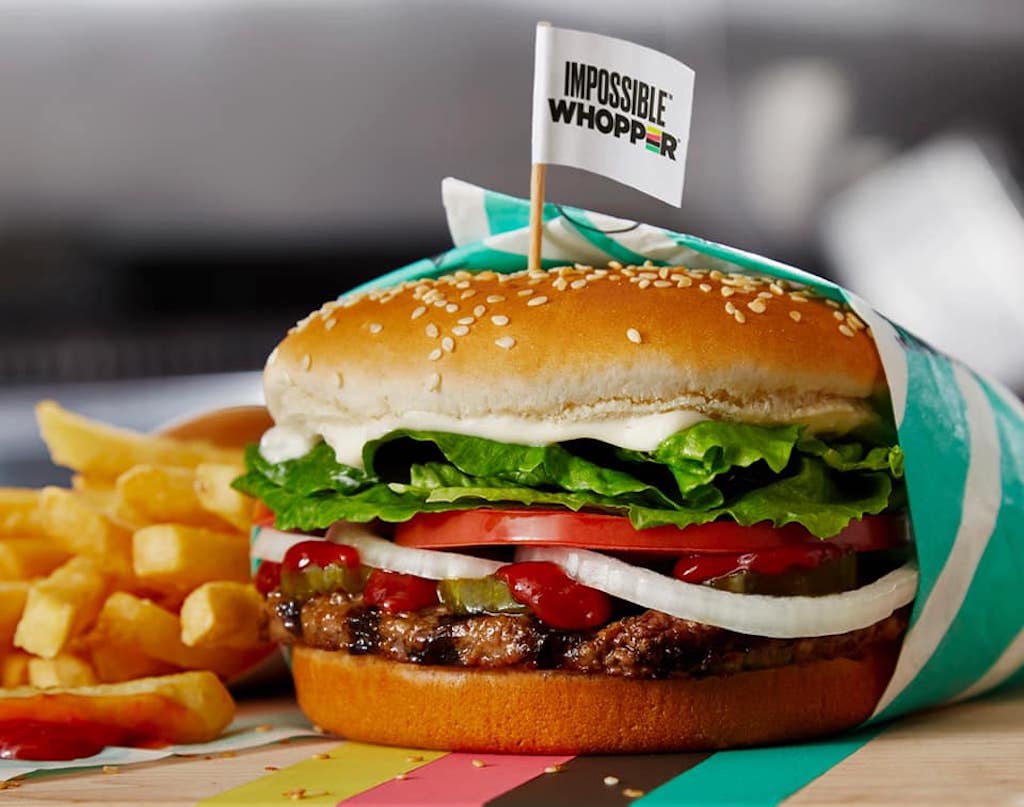
That partnership is one of a number of long-term foodservice deals cultivated by Impossible Foods over the years – the company, it must be said, has an outstanding foodservice record. Its eight-year-long link-up with American chef David Chang and his Momofuku restaurant group is just one example – it’s also present in 15,000 Starbucks stores (five years), Disneyland (four years), White Castle (six years) and Bareburger (seven years), among others.
“What keeps me up at night is the opportunity, not the cynicism.”
McGuinness underlined the company’s goals to increase retail distribution – it’s on under 1,000 store shelves (though it recently launched in Whole Foods). “We’re in first gear, it’s nobody’s fault. And we have 15% awareness, 85% of the country hasn’t heard of us… and 6% household penetration – so 94% of America is yet to try an Impossible product.”
He added that the steps the company needs to take to grow aren’t “high math, crazy things”. “You can expand awareness through paid advertising. You can expand household penetration through more distribution. Food companies do this every day.”

This is why Impossible Foods’ launched its first-ever campaign last summer, followed by what McGuinness described as “plant-based’s biggest” marketing drive ever earlier this month. Launched at the Met Gala, it will be a three-month campaign across TV, streaming, digital, social media and billboards – and focuses on “solving the meat problem with more meat” (plant-based, that is).
It’s a forward-looking, optimistic statement by the company’s CEO, who looked visibly excited about the new marketing initiative. Whether it will translate into more customers, time will tell.
“We want to encourage meat-eaters to try and eat our food… I’m not interested in stealing share from other plant-based companies.”
This is a familiar but important assertion from McGuinness. “My job is not to steal share from Beyond Meat – then I’ve just moved the deck chairs around, and the category stays at the same size. We have to make the category bigger,” he said at Adweek X in December.
The same week, after announcing the Impossible Hot Dog, the company told Green Queen: “We’re trying to reach meat eaters – not vegans, vegetarians or those already eating sustainable diets. That’s why we focus on making products that appeal to actual meat-eaters. Our goal is not to compete with fruits, vegetables, and other whole foods, but to offer meat-eaters products that are better for them and the planet.”
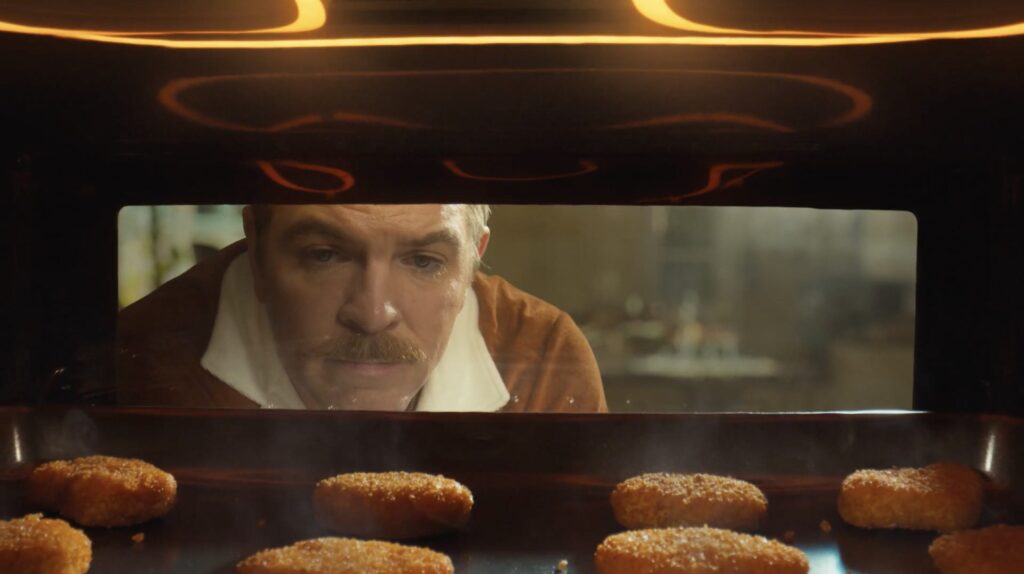
McGuinness echoed this sentiment in his Bloomberg interview, suggesting that appealing to non-meat-eaters is “not going to move the needle”, whether that’s from a value, revenue or mission perspective. “If you’re trying to have less water, less [deforestation], less GHG, it only works if you’re displacing animals,” he said.
While vegans and vegetarians are obviously important to plant-based meat companies, the real value is bringing over the meat-eaters. “People might be surprised to know that 90% of Impossible consumers also eat meat, and more than one in two who try us for the first time intend to do so again,” Impossible Foods told this publication in March.
McGuinness highlighted the importance of speaking to this target audience “in a respectful, inviting way, not an insulting way, which is what I think was done in the past”. Alienating meat-eaters won’t help – this is precisely why Starbucks’s Impossible Breakfast Sandwich has cheese and eggs, and the Impossible Whopper contains cheese and special sauce. They’re not vegan, but that’s not the target market anyway.
“There are a lot of companies that are making food that’s not great food. There’s 200 plant-based companies in America – probably only need three, or two. So there’s a lot of small companies making not-so-great food and people are having bad first impressions.”
You can look at this two ways. There is definitely a case to be made about oversaturation in the industry – 2023 saw several startups cease operations as they ran out of cash in a highly competitive market. But on the other hand, suggesting a monopoly of two or three companies in the entire category sounds a bit… Big Food?
“Many consumers have unfortunately had a less-than-positive first impression of various plant-based products, and that casts doubt on the rest of the category as a whole,” the company has previously told Green Queen.
McGuinness alluded to this in an interview with Food Dive earlier this month, where he took aim at what he labelled “the biggest ‘all other’ I’ve seen in any category”. “There are 100 of these little micro companies that are throwing out products that are not particularly good,” he said, particularly describing fungi and mycelium startups. “I think there are certain brands and products that are the problem,” he said.
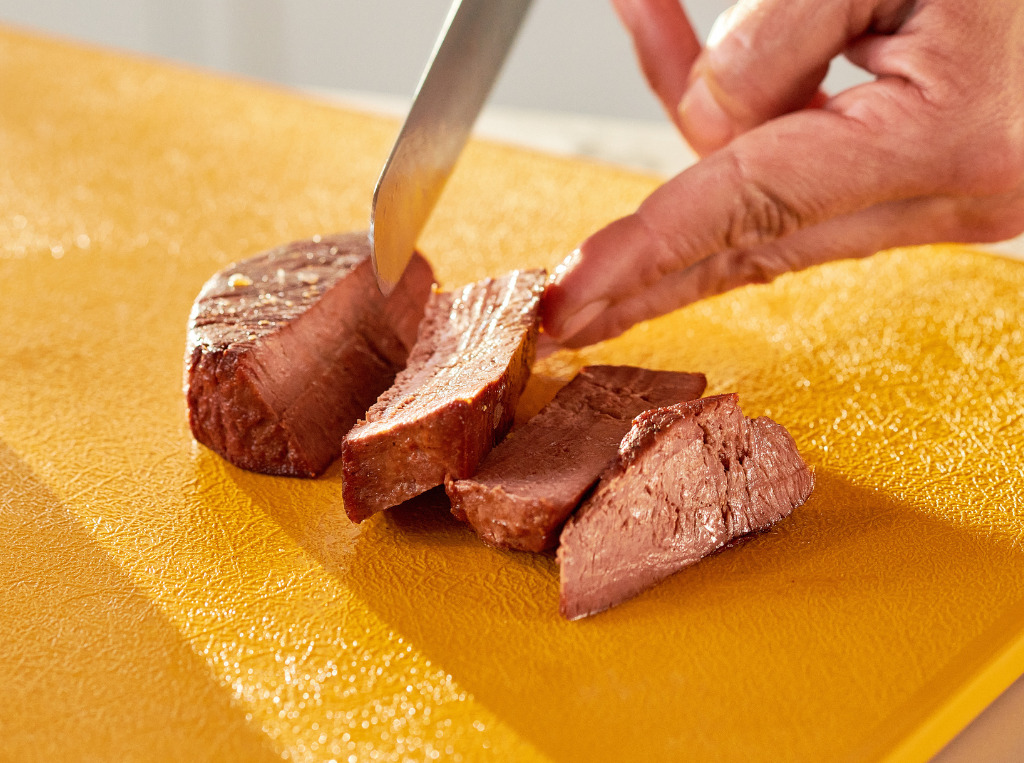
“Impossible Foods and Beyond Meat [are] the only true meat alternatives in the category,” he added. “You’re going to be left with a couple of brands and private labels, and that’s going to be the category.”
We’re already seeing consolidation in the industry, but diversity and consumer choice are vital – that Kroger survey found that the range of options in supermarkets is the second-most influential purchase factor for plant-based meat (with 39% choosing it). Monopolies, meanwhile, are dangerous, especially in the food industry. It’s exactly what the meat giants have been doing for years, with National Beef, JBS, Cargill and Tyson owning a jaw-dropping 85% of the US meat market.
It’s something the documentary Food, Inc. 2 highlighted. “Monopoly power is a threat to our freedom,” the film said in one of its calls to action. Take the case of Abbott Nutrition, which – along with Meat Johnson Nutrition – owns 80% of the baby formula market. When there were safety issues with its products, Abbott recalled its formula and shut its largest plant, sparking an infant formula shortage.
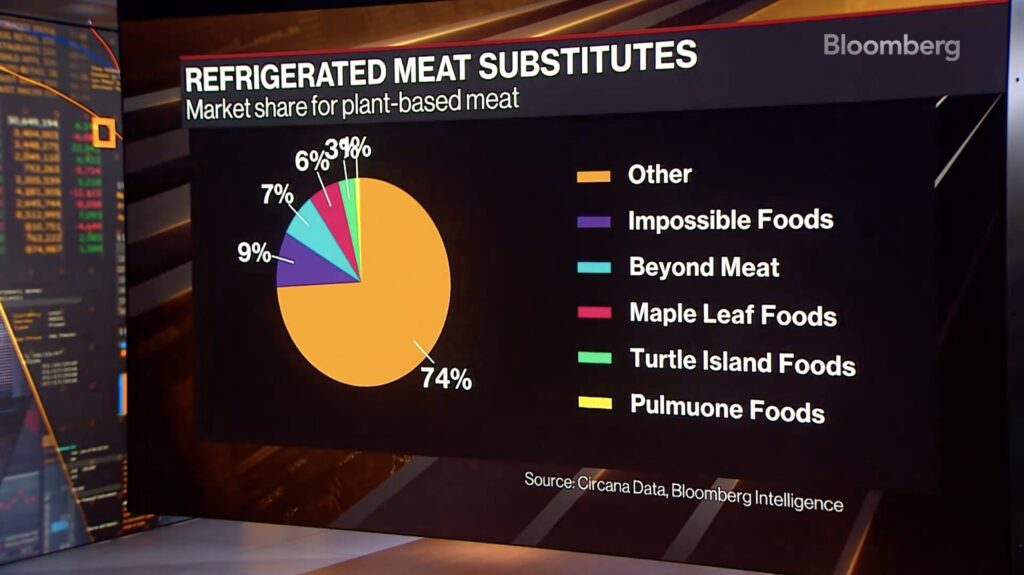
Things are more evenly split in the plant-based sector – according to Bloomberg, Impossible Foods leads the refrigerated space with a 9% market share, but is trumped by Kellogg’s (which owns MorningStar Farms), Beyond Meat and Conagra (the parent company of Gardein) in the freezer aisle, where it commands a 5% share.
“We don’t need to go public in the near future… That said, it would be nice to go public at some point on our terms, to further capitalise and cement the legacy of the company.”
An Impossible Foods IPO has long been rumoured, with speculation rife last month after McGuinness indicated to Reuters that the company is exploring a liquidity event that could result in a sale or a public offering. Green Queen understands that the company isn’t committing to this – it has maintained that it’s the fastest-growing brand in the category.
Any liquidity event, if it were to happen, wouldn’t take place for another two to three years. And at present, expanding distribution and strengthening its portfolio are the business’s key priorities.

“We’re lucky enough to be pretty well-capitalised right now,” McGuinness told Bloomberg. Not needing to go public was a good position to be in, he explained as the IPO markets are not “great right now”. “We’ll go public when we’re prepared and we’re ready. I think things were rushed maybe in the past – we don’t need to rush, luckily.”
The company will hope that this will put IPO rumours to bed for a while, as it ramps up its marketing efforts to meet the meat-eaters where they’re at, shrug off the elitist tag, and keep the price tag wallet-friendly. But would a monopoly make sense?


